Primary Duties of a Security Officer
A security officer’s primary duties include patrolling premises, monitoring surveillance equipment, inspecting buildings, and securing access points to ensure safety and prevent unauthorized entry․
1․1 Patrolling Premises Regularly
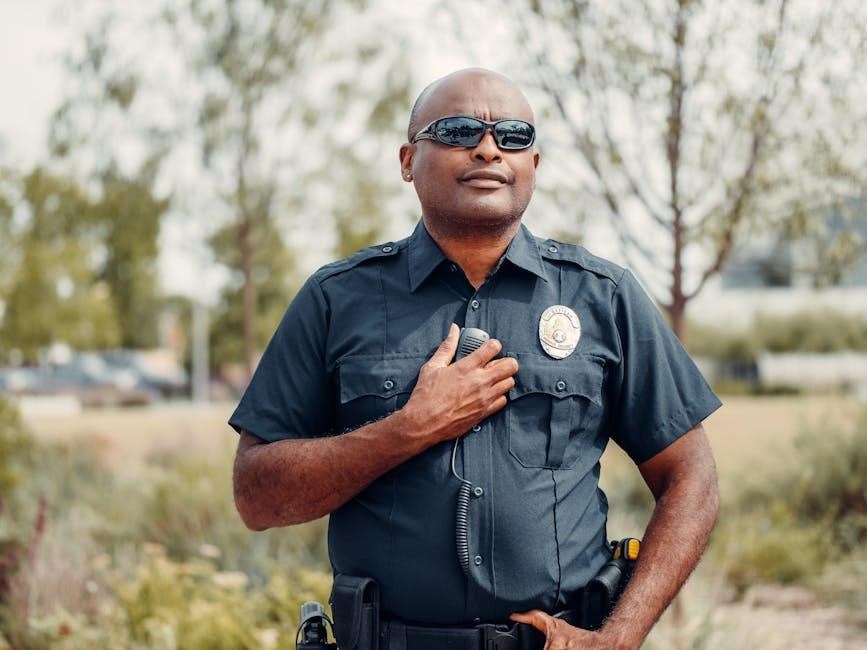
Patrolling premises is a fundamental duty of a security officer, ensuring the safety and security of the property, personnel, and assets․ Regular patrols involve systematically inspecting both interior and exterior areas to detect and prevent potential threats or breaches․ This includes monitoring access points, parking areas, and sensitive zones to maintain visibility and deter unauthorized access․ Security officers must remain vigilant, observing any suspicious activity or behavior that may indicate a security risk․ By conducting consistent and thorough patrols, they help create a secure environment, enabling the organization to operate smoothly․ Patrolling also allows officers to respond quickly to incidents, ensuring timely intervention and minimizing potential damage or harm․ This proactive approach is essential for upholding safety standards and protecting the organization’s interests․ Regular patrols are a cornerstone of effective security management, ensuring all areas remain under constant surveillance and control․
1․2 Monitoring Surveillance Equipment
Monitoring surveillance equipment is a critical responsibility of a security officer, ensuring real-time awareness of the premises’ security status․ This involves continuously observing CCTV cameras, alarms, and other monitoring systems to detect and respond to potential threats․ Security officers must analyze footage for suspicious activities, such as unauthorized access or unusual behavior, and take appropriate action․ They also perform regular checks to ensure all equipment is functioning correctly, reporting any technical issues to maintain system reliability․ Effective monitoring enables rapid response to incidents, minimizing risks and ensuring the safety of personnel and assets․ By staying alert and attentive during surveillance, security officers play a vital role in preventing breaches and maintaining a secure environment․ Their ability to interpret and act on surveillance data is essential for effective security management and incident resolution․ This duty requires strong observational skills and the ability to remain focused over extended periods․
1․3 Inspecting Buildings and Access Points
Inspecting buildings and access points is a fundamental duty of a security officer, ensuring the integrity and security of the premises․ This involves conducting thorough checks of all entry and exit points, including doors, windows, gates, and locks, to identify potential vulnerabilities․ Security officers also examine the condition of walls, fences, and other structural elements to prevent unauthorized access or breaches․ Additionally, they verify the functionality of access control systems, such as keycard readers or biometric scanners, to ensure they operate effectively․ Regular inspections help detect and address security risks, such as damaged locks or unsecured areas, before they escalate․ By systematically evaluating the physical environment, security officers play a crucial role in safeguarding assets, personnel, and property․ Their inspections contribute to maintaining a secure and compliant environment, adhering to organizational safety standards and protocols․ This proactive approach helps prevent unauthorized entry and potential threats․
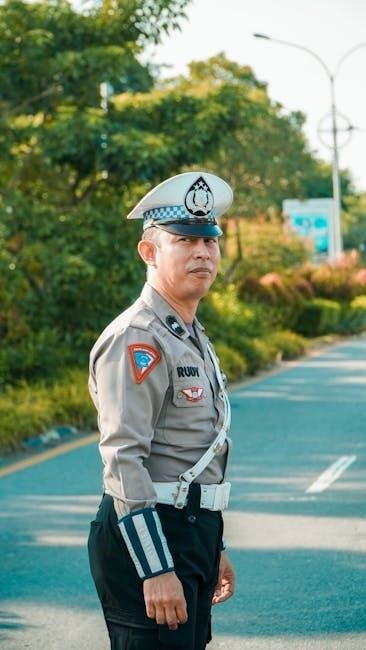
Key Responsibilities of a Security Officer

Security officers are responsible for responding to incidents, handling sensitive information, and providing first aid․ They ensure safety protocols are followed and assets are protected effectively․

2․1 Responding to Security Incidents
Security officers must respond promptly and effectively to security incidents, ensuring the safety of personnel and assets․ This includes assessing situations, taking appropriate actions, and coordinating with emergency services when necessary․ Their role involves addressing alarms, disturbances, and potential threats while maintaining calm and professionalism․ They are also responsible for securing the scene, gathering information, and documenting incidents for further investigation․ Effective communication and decision-making are critical in resolving security breaches efficiently․ Additionally, security officers must collaborate with law enforcement or internal teams to investigate incidents and prevent future occurrences․ Their ability to handle high-pressure situations ensures the organization’s safety and operational continuity․ Proper incident management is a cornerstone of their responsibilities, ensuring minimal disruption and maximum security․
2․2 Handling Sensitive Information and Assets
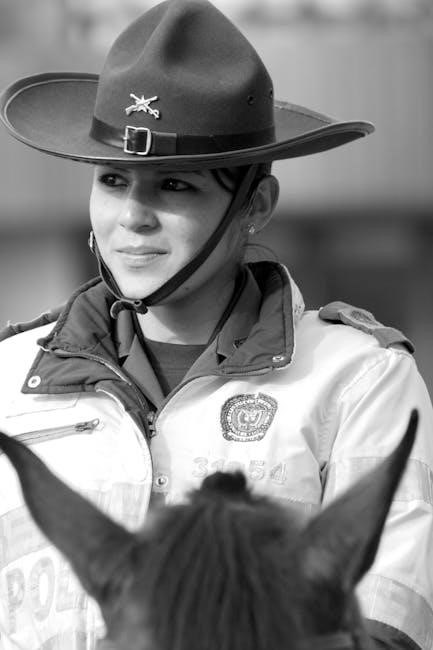
Security officers are entrusted with safeguarding sensitive information and assets, ensuring their confidentiality, integrity, and availability․ This involves controlling access to restricted areas, managing sensitive documents, and overseeing the secure storage of valuable items․ They must adhere to strict protocols to prevent unauthorized access or breaches․ Handling sensitive information requires meticulous record-keeping and compliance with organizational security policies․ Security officers also conduct regular audits to verify the security of assets and information systems․ Their role extends to training employees on security best practices, ensuring all personnel understand the importance of protecting sensitive data․ By maintaining vigilance and enforcing security measures, they play a crucial role in mitigating risks and safeguarding organizational resources․ Their responsibilities are integral to upholding the organization’s reputation and operational security․ Effective management of sensitive information and assets is a key aspect of their duties․
2․3 Providing First Aid and Emergency Assistance
Security officers are often the first responders in medical emergencies, providing immediate first aid and assistance․ They are trained to handle injuries, stabilize conditions, and prevent situations from worsening․ Their duties include administering basic life support, such as CPR, and using equipment like defibrillators․ They also assess the scene to ensure safety, provide comfort, and reassure individuals until professional medical help arrives․ Security officers must maintain up-to-date certifications in first aid and emergency response․ Their role extends to documenting incidents, reporting details, and collaborating with emergency services․ Quick and effective action by security officers can significantly impact outcomes in critical situations․ This responsibility underscores their multifaceted role in ensuring not only security but also the well-being and safety of everyone on the premises․ Their ability to respond swiftly and appropriately is vital in emergencies․
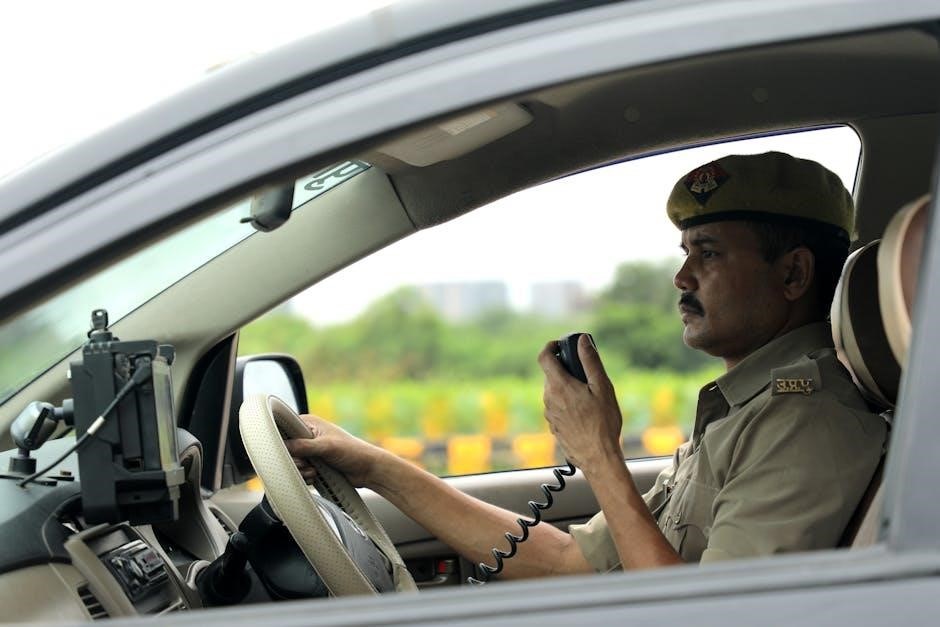
Special Roles and Additional Duties
Security officers may take on special roles, such as supervising teams, managing security protocols, or handling sensitive assets, ensuring compliance with organizational safety standards and procedures․
3․1 Supervising Security Guards and Personnel
Supervising security guards and personnel involves overseeing their daily activities, ensuring adherence to protocols, and providing training to maintain professionalism and effectiveness in securing premises and assets․ This role requires strong leadership and communication skills to manage teams efficiently․ A security officer in this position must also handle disciplinary actions and performance evaluations to ensure optimal security operations․ Additionally, they are responsible for scheduling shifts, assigning tasks, and coordinating with other departments to maintain a secure environment․ Effective supervision ensures that all security measures are implemented correctly and that the team is prepared to respond to any incidents promptly․ This duty is crucial for maintaining overall organizational safety and security standards․
3․2 Acting as Chief Security Officer (CSO) or Chief Information Security Officer (CISO)
As a CSO or CISO, a security officer oversees the organization’s overall security strategy, ensuring the protection of physical and digital assets․ This role involves developing and implementing security policies, managing risks, and leading incident response efforts․ The CSO/CISO collaborates with senior management to align security goals with business objectives․ They also oversee compliance with legal and regulatory requirements, ensuring all security measures meet industry standards․ Additionally, they manage budgets, supervise security teams, and stay updated on emerging threats to maintain a robust security posture․ This position requires strong technical expertise, strategic thinking, and leadership skills to safeguard sensitive information and assets effectively․ The CSO/CISO plays a pivotal role in maintaining organizational resilience and trust․
3․3 Ensuring Compliance with Security Policies and Procedures
Security officers must ensure strict adherence to established security policies and procedures within the organization․ This involves conducting regular audits and inspections to verify compliance with internal and external regulations․ They review security protocols to identify gaps and implement necessary updates․ Training employees on security best practices is a key responsibility, fostering a culture of awareness and accountability․ Officers also monitor access control systems, ensuring that only authorized personnel can enter restricted areas․ Additionally, they document incidents and prepare reports to maintain transparency and accountability․ By enforcing compliance, security officers help mitigate risks, protect sensitive information, and uphold the organization’s security standards․ This role is crucial for maintaining operational integrity and safeguarding assets effectively․ Their efforts ensure that security measures are both effective and aligned with organizational objectives․
Understanding the Role in the Organization
Security officers play a crucial role in maintaining organizational safety and security by collaborating with other departments to ensure effective security measures are implemented and upheld consistently․
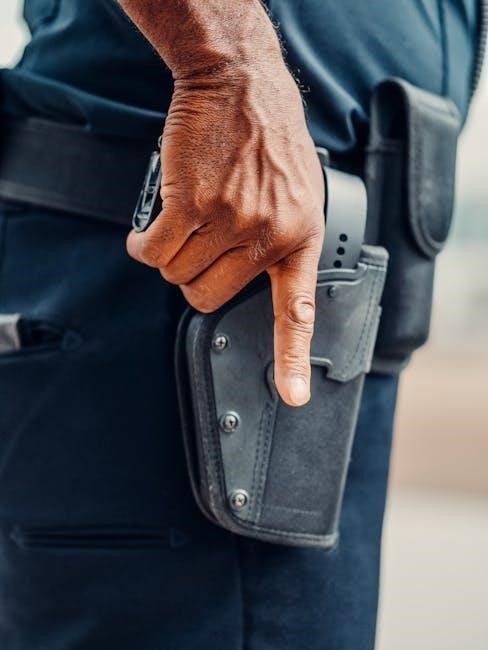
4․1 Importance of Security Officers in Maintaining Safety and Security
Security officers are indispensable in maintaining safety and security within organizations․ They ensure the protection of personnel, assets, and premises through vigilant patrols, monitoring of surveillance systems, and immediate response to incidents․ Their presence deters potential threats and fosters a secure environment, allowing employees and visitors to focus on their activities without concerns․ Additionally, security officers handle sensitive information and assets with care, ensuring compliance with security policies․ They also provide first aid and emergency assistance, which is critical in safeguarding lives during critical situations․ By performing these duties, security officers uphold the organization’s safety standards and contribute significantly to its overall well-being and operational continuity․
4․2 Collaboration with Other Departments for Effective Security Measures
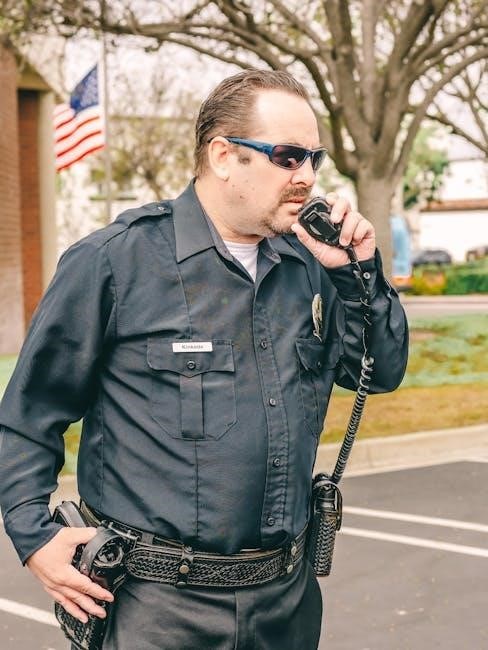
Collaboration between security officers and other departments is crucial for implementing effective security measures․ By working closely with HR, IT, and facilities management, security officers ensure comprehensive safety protocols; They share intelligence on potential threats, align security policies with organizational goals, and participate in risk assessments․ This teamwork enhances incident response, ensuring swift action during emergencies․ Security officers also train staff on security awareness, fostering a culture of vigilance․ Their involvement in strategic planning sessions helps integrate security into the organization’s operational framework․ Through consistent communication and coordination, security officers contribute to a cohesive and resilient security system, safeguarding both physical and digital assets effectively․